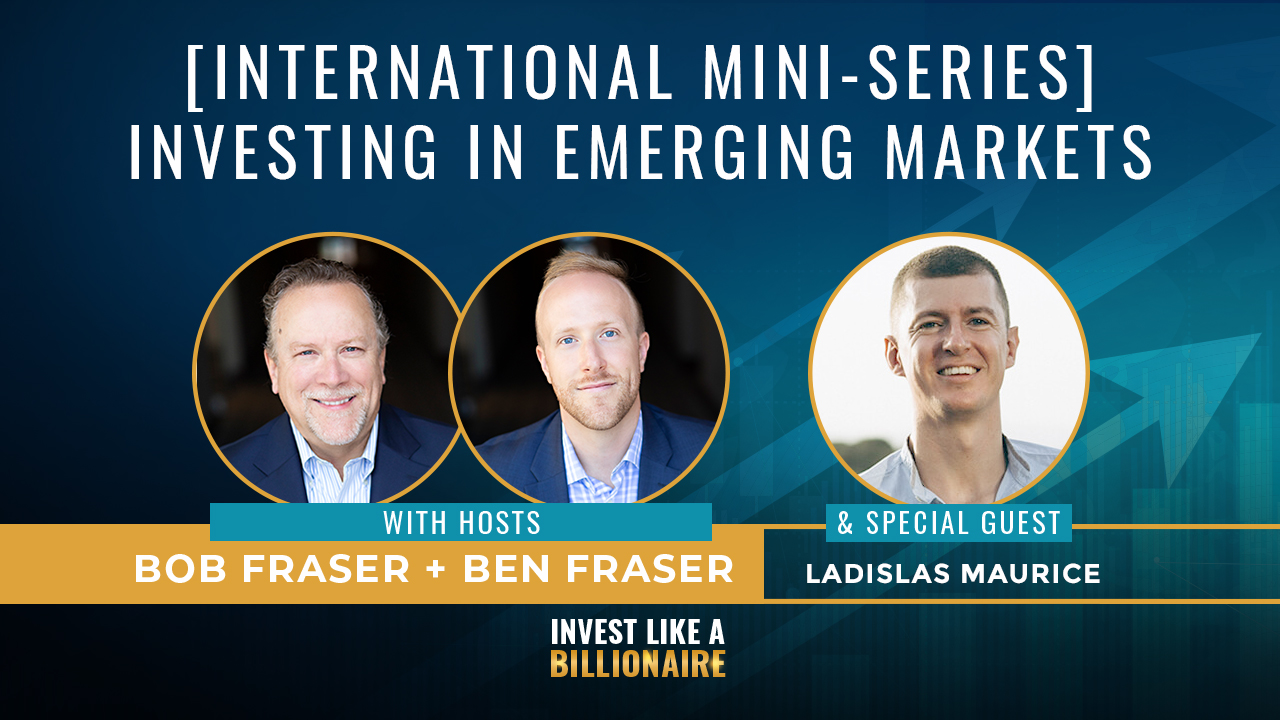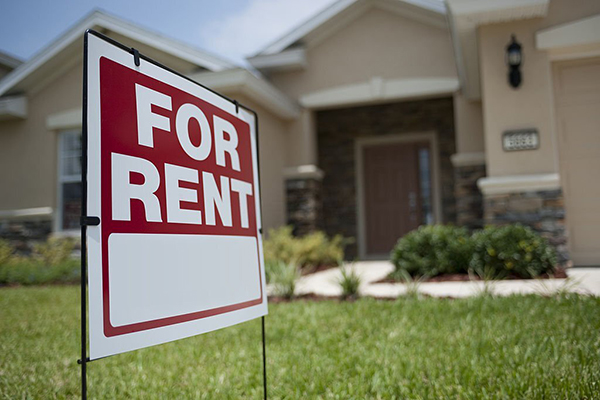
Ladislas Maurice, dubbed the “Wandering Investor,” called his corporate career quits to travel the world in search of investing opportunities. Focusing mostly on emerging and frontier markets, Ladislas’ has used investing to make money, but also to secure residency in countries around the world. Tune in to hear his unique experience, as well as what cash flow, cap rates, and liquidity look like across the pond, and how it all compares to the US real estate market.
—
Watch the episode here
Listen to the podcast here
[International Mini-Series] Investing In Emerging Markets With Ladislas Maurice
We’ve got a fun episode and this is part of our international segment series. This is the first one of several that we’re going to do. As you know, most of our episodes were targeting US-based investments but we live in a global world and it’s surprising. Being in the US, you don’t think about the outside much. It’s something we love. We have some international investors in our funds who love these broader perspectives on other countries and what it’s like. We dive into different European countries, as well as South America with Ladislas Maurice, who has been doing this. He’s called himself The Wandering Investor.
He has talked about some of these other countries and the amazing investment opportunities that come with side benefits of citizenship and other things. This is definitely super interesting.
To be clear, we love US real estate. This is not to say that it’s time to leave the US, but it is interesting to look at other options, compare and see what’s out there. Enjoy this episode. We hope you like it.
—
In this episode, we have an awesome guest. It is Ladislas Maurice in Turkey. We are super excited to have you on the show. This is going to be a new topic. This is investing in international markets. Ladislas is an expert in this. He has been living and investing overseas for a long time. We’re doing a little segment here on our show on international investing to highlight other alternative investments outside of the United States, which our investors are most familiar with. Ladislas, thanks for coming on.
Thanks a lot for having me over. I appreciate it.
Tell us a little bit about your journey, your background, and how you ended up where you’re at now?
I went to a business school in Canada. I also went to business and law school in Australia. I found a job in a corporate in Switzerland, working for Nestle, the big food company. They then sent me to Africa. First to South Africa and then to Ghana. I lived for seven years in Africa and my last role there was being on the executive board of Nestle Ghana in charge of the dairy business for a few West African countries. Essentially, I spent most of my twenties in Africa. When I hit 30, I thought, “It was exciting. I did all that with this one company. It was great. I’m getting into my 30s now. I want to try something new.” Before I do that, my plan initially was to move to Dubai and look for another corporate job there.
I was like, “Let me go traveling for a bit.” I went on a road trip from Oman near Dubai to Paris by car. I went through all of Iran, Armenia, Georgia, Turkey, Greece, Bulgaria, Romania, Ukraine, Central Europe and then Paris. I did that over a few months and it opened my mind to a world of opportunities. The reality is when you work full-time in corporate or any job for that matter, you’re working 50, 60, sometimes 70 hours a week. You’re always thinking about that next presentation, those targets, all the issues, etc. You don’t have time to reflect. I’m not talking about it from a philosophical point of view, but mostly to reflect on your own money and how you invest your savings. Along the way, I saw all of these opportunities that I was able to explore. I would go to Georgia, for example, to Tbilisi, a beautiful city.
This is on the Black Sea for those Americans who may be thinking about Georgia as a US state.
It’s Georgia the country. I go into these beautiful historical cities and I had see stunning real estate that is really affordable. I had run the numbers. I would go see lawyers and real estate agents. I then started doing flips. I would buy an apartment, get it renovated and then sell it. I started doing that and as I was doing this, I kept pushing back the time that I had to be looking for a job. At some point, I just wasn’t looking for it anymore. I kept doing more flips and more deals. I would be posting pictures on Facebook when it was still a thing. My fellow Millennial friends would be asking me, “Ladislas, you’re always in these weird countries but you don’t seem to have a job. You haven’t had a job for a while.”
I was known as the serious corporate guy who have this career on track and all that. Suddenly, I’m bumming around in all these places. I started this blog to document my journey and also to help. It became part of my process. When I have a thesis, I write it down, especially from a macro point of view. I would put down all the macro thesis. I go into the exact case study of an apartment. This is exactly how much I could earn, etc. This is the flip or this is how much I could earn by putting it on Airbnb or long-term rentals.
The blog then started having a life of its own. It expanded into YouTube channels as well. Now, I do this full-time. I manage money. I travel around the world full-time looking at opportunities, mostly in emerging and frontier markets like the Africa, Balkans, Eastern Europe, Central Asia and increasingly, Latin America as well. I now have this blog on the side where I help people invest in emerging markets and also immigrate to countries with lower taxes and often more freedom.
We’re in America. In America, the rest of the world doesn’t exist for us. We love alternative investments but that sounds like an alternative on steroids or a far alternative. Why is it so great? What is so great about these markets? As we sit here, you’re getting ready to buy a couple of apartment complexes in Izmir, Turkey. I know Turkey. I read the headlines in the American newspaper and it’s talking about the crazy right-wing leadership there. They’re talking about the crazy currency. The currency is falling like a rock and the stress on the leadership. Tell me why this is a great place to invest.
[bctt tweet=”There’s not always a complete correlation between what is in the news and what is actually on the ground.” username=””]
I could throw it back to you and say a few years ago, people said the US was going down. You had a crazy right-winger. It’s the end of the dollar. You’re printing all that money and housing has been doing fantastic. There’s not always a complete correlation between what is in the news and what’s actually on the ground. Investing in such markets sometimes comes with other benefits. For example in Turkey, if you invest, for one, real estate is cheap.
Cheap means what? Give us a couple of examples here and talk about your apartments and your cap rates.
I’m going to have to speak and I need to calculate because I speak in price per square meter and not price square foot. Near core in Istanbul, which is a city of fifteen million people, a historical city, etc. It’s older than anything that exists. In the US, you would be talking about $1,300 per square meter.
For what core assets?
For apartments and for residential. Renovated, if you want it in good condition, you would be paying about $150 per square foot or near core in a good condition in a city of fifteen million people with one of the world’s biggest airports and direct connections to everywhere.
Cap rate is universal. That’s the percentage. What is the cap rate? Net operating income divided by the cost.
In Turkey, if you’re going to be doing long-term rentals to locals, you’ll be making 3% to 5% gross, which is absolutely not interesting by American standards. You can’t even use leverage as a non-resident. When you invest in a market like this, you don’t go in there for cap rates on the local market.
3% to 5% cap rate is US-level.
It’s rental yields, yeah. For all the risks, etc., it’s not that interesting. As a non-resident, you can’t leverage. As a local citizen living locally, you can, but it’s not always easy. Essentially, you can’t leverage. Most of these international markets and emerging markets, you cannot leverage.
You’re not selling me very well, Ladislas.

I’ve got to say what these markets are for what they are and we’ll discuss. Let’s first discuss Turkey and then we’ll discuss the whole leverage issue because it is a point that needs to be addressed. In Turkey, if you go into midterm rentals where you target, there are a lot of European digital nomads now. They’re always working. They’re traveling and Turkey is a fun city. It’s a big city and it’s very affordable. If you target midterm nomads and Airbnb, you can make nets of fees probably between 5% and 7% unlevered, but you’re paying a very low price per square meter for such a massive city.
It comes with two benefits. If you invest at least $75,000, it gives you residency rights. At any given point, you can move to Turkey with your whole family and you can say, “I want to live here.” You just need to go to the notary, sign a few documents, and you’ll be getting a residency card that is valid that you can renew every year as long as you own the property. It gives you a plan B and a beautiful place to live. It’s like Greece. I’m in Izmir and right across from Izmir are all the famous Greek islands.
Is Izmir on the Aegean?
It’s right there. It’s the same water, same food and same everything but half the price. If you invest for at least $250,000, though the limit is now being raised to $400,000, you get citizenship for yourself, for your spouse, and for all your underage children within nine months of buying these properties. It then goes down the generations. Putting $400,000, for some people, is a lot of money. For others, not so much. For $400,000 of objectively affordable real estate in historical cities with all right-ish cap rates that come with a whole bunch of risks like political, economic, currency, and so on, you get citizenship for yourself, your spouse or your children, all your grandchildren and great-great-grandchildren. You’re making a generational move. I find this to be unique.
What Americans may not realize about Turkey is that it is actually a NATO country. We think of it as this Islamic republic or something, but it’s not. It’s a secular state with obviously a lot of Muslims and run by Muslims and it is a NATO country. It’s highly westernized, especially as you point out the Greek areas which used to be a part of the Byzantine Empire. There’s a lot of Greek history and a lot of Greek food and everything else. It’s semi-Westernized in some areas.
I would argue there is a lot of currency risk because you have real estate. Obviously, you’re operating a real service with real rents. The political risk, I can’t speak to. I don’t know enough about what the political risk is. As you said, that’s definitely interesting although the inability to leverage makes it not that attractive as a purely financial investment.
If you become a resident or a citizen, does that give you the ability to leverage at that point, if you invest $400,000? Eventually, you can refinance and pull some equity out or how does that work?
Once you become a citizen, then you have access to leverage. You generally need to live there as well as a citizen and a resident. You’re talking interest rates of 13% and 14%, which is rather high. When inflation is running at 50% a year, it actually makes sense because the interest rates are kept artificially low here.
Leverage is the way to get rich in a country like that. You borrow as much money as you can in Turkish lira and know that it’s going to be devalued like crazy. A lot of these numbers are very foreign to US investors, me especially. You hear 50% inflation at 30% interest. That’s very different from what we are experiencing here. You said you look at macro environments when you’re looking at deals. Talk about these deals you’re going to be closing on for little case studies on a macro level, Turkey specifically. What makes you comfortable buying these properties? Where do you see the value aside from the cool side benefits?
I’m in it mostly for the side benefits, to be completely honest with you. From a purely financial point of view, I see other markets as more appealing. One of them potentially being Colombia, which is a lot more accessible to Americans. If you go into Medellín and target midterm rentals, 1 month to 6 months, you can get cap rates of approximately 10% net without the use of leverage, which is very interesting.
[bctt tweet=”Europeans are often quite cheap and like to cut corners. Americans just want what’s best. They want American standards.” username=””]
What people don’t realize is Medellín is a European city. It’s beautiful. It’s in the mountains. It’s gorgeous. It’s one of the most beautiful cities in the world really.
It’s stunning. If you go for long-term local rentals, the cap rate is 3% to 4%. What’s happening is as in Europe, but even more so in America, there are millions of Americans who now can work entirely remotely. They earn very decent money typically when they’re able to work online. They now believe that America is completely toxic and they don’t want to be associated with the place anymore. They’re very happy to leave America. I’m talking about both Democrats and Republicans, etc. I’m not here to talk politics. I’m pretty sure you can agree that a lot of people think that the US has become a toxic place. They moved south within the same time zones. They can cut down their cost of living by half and then get to live in Medellín and save money with an amazing lifestyle.
The good thing with Americans compared to Europeans, Europeans are often quite cheap. We are always trying to cut corners, save and stuff. When Americans go to Medellín, they want the best. They want American standards in Medellín. When you’re able to target those markets, which locals are typically not capable of doing because culturally, they like to cut corners, then you find yourself in a niche and are able to get these profitable customers. There isn’t that much supply either. It’s one of the advantages of investing in markets where there isn’t a lot of leverage.
I understand the leverage game. You put 20% down and you’re cashflow positive from day one, and it’s the tenants that pay your rent, etc. That’s fantastic, but what happens is when interest rates rise a lot and you are not in a fixed term mortgage, but you’re in variable terms, you can be underwater very quickly. When you’re in markets like Colombia, the fact that interest rates are going up doesn’t matter because the market is essentially pretty much all cash-based.
Your investment is not dependent on interest rates and central bank policy. Investing in markets like this, though they often provide less upside in the long run, because often they deal with issues like currency devaluation, what they do provide is a lot of diversification in your portfolio. Not just from my jurisdiction, political, lifestyle or a plan-B point of view, if you invest in real estate in Colombia, depending on how much you invest there, you can get either a visa or even residency.
It also provides you with a hedge and diversification from an interest rate and from a central bank policy. As part of a wider basket of real estate investments, having some of your investments in such markets makes sense. Would I tell anyone in your audience to forget about the US, the dollar is finished, go all-in in Columbia or go all-in in Turkey? Hell, no. Keep assets in the US. Your assets are probably a lot safer there, but you want that diversification. Especially once you start to reach a certain level of capital and wealth, that’s when you need to start thinking, “Now is the time for me to diversify in case things take a bad turn in my own country.” At least, I have a plan B and I have savings abroad.
It would be great if you could find a plan B and good financial investments as well. Medellín is interesting because it is so beautiful and accessible. It’s a short plane flight from anywhere in the United States pretty much.
I have to say, there are elections coming up in Colombia. There’s a crypto communist that’s up there leading the polls. That’ll be a coin toss. When you invest in these countries, there are always risks.
It could be the next Venezuela and they want to nationalize all the assets and demonize the foreigners.
I’m looking at an agricultural land in Venezuela and it’s about $50 per acre of agricultural land.

That’s so sad. Here’s an economy that has been destroyed by politics.
I was looking at two plots. One was 500 hectares. That would be over 1,000 acres for $60,000 with a lake. There is water everywhere and fruit trees. You’re allowed to buy as a foreigner there. It’s a bit of a process, etc. and there’s always the risk of you need to maintain it because things grow very quickly. You need to pay people locally. It costs about $150 to $200 to have someone full-time. You need to trust people.
What does it cost you to have someone full-time?
$150 to $200 to have someone full-time to manage a month. If you want an inflation hedge, does it get better than that?
No.
Especially buying agricultural land at $50 per acre in a country with the biggest oil reserves in the world ahead of even Saudi Arabia. In a world where it would appear that the West is cutting itself from Russian oil, we’ll need alternatives, and there’s Venezuela right there.
That’s so interesting how you mitigate the risk of that.
What has your experience been in these countries that have high inflation? Has real estate in those countries been a great hedge against that? What are the additional risks that you’re taking on in a hyperinflation environment?
It’s a yes and no. When there’s a lot of leverage in the system, essentially, real estate is not just a real asset. It’s also a financial asset. When you buy real estate in the US, you may think that what you have is a real asset that you can touch. Probably 60% of the value of that real estate is the financial part. It’s the leverage that’s giving the value. What happens is when there’s initially a lot of inflation, you can see the prices in real terms go down because inflation is going up faster than the price of the real estate.
Usually, that’s just a lag. Usually, it does track.
[bctt tweet=”When there’s a lot of leverage in the system, essentially real estate is not just a real asset. It’s also part financial asset.” username=””]
Not necessarily. It’s not that simple. I’ve seen other markets where there was not a lot of leverage and then inflation started showing up. What happens is anyone that was sitting on cash then tries very quickly to buy hard assets. Everyone rushes into real estate. You suddenly see a spike in pricing. Once all the cash that was sitting on the side got invested because it all got invested when everyone was panicking and people weren’t selling, then suddenly prices go down again in real terms. I wouldn’t say that real estate is the perfect hedge against inflation. It depends on the markets and the dynamics.
As you point out, there’s a leverage component. What is the cost of the debt? There’s also an income component if there’s a massive recession going on. Over the long haul, it will track, but as he’s pointing out, it is not a perfect track. There are many components to that. I was in Zimbabwe in 2007 and it had one of the worst inflation ever recorded. I remember they were taking grocery bags full of money to fill the gas tank of the car. A couple of years before that, one of the pastors there of a big mega-church told all of his congregation, go borrow as much money as you can and buy real estate.
He ended up paying off buying this giant 6,000-square-foot house and paid $300,000 for its equivalent and paid it off with a grocery bag full of money. Truly, it can also be a home run but it’s not without its risks. I appreciate that you’re not telling everybody to go rush out and do it, but also exploring the opportunities.
You talk about Zimbabwe. I went there on a trip in 2011 because I lived in South Africa. I drove up to Harare. It was after the economy had just dollarized. Two months after the whole crisis, they had kicked out all the farmers. I went there to have a look at real estate and I was hoping to find some bargains. Essentially, real estate was quite expensive after this whole inflationary period. It was more expensive than in Johannesburg which was rather surprising. I don’t know what it was before or if it became cheaper or more expensive, but it was pretty expensive. No one wanted to sell because of capital controls. If you’re going to sell and have the money in a bank account, but you can’t get the money out of the country and you have to trust the banking system, you just sit on it.
You don’t think about things like that. I remember at the time, there was a big hotel at the Victoria Falls, which is this mega world-famous fall. There was the ultimate 100-year-old hotel historic landmark and they’re trying to sell it. I was interested at the time. I also thought about the great financial crisis when Greece was hitting the wall. What a time to go buy a Greek hotel for pennies on the dollar and something like that. It was before you got started, but there are a lot of opportunities. Maybe the way to stick the fork in something like that is what you’re doing. You have to go there, figure it out and talk to the locals, and figure out how to manage it, the laws and the risks.
There are two points that people and your audience need to understand when you invest in such emerging markets. One is usually liquidity is a lot lower than in the US. The US is a blessing. You list the house and then four hours later, you can get the goods.
It’s not always like that but it sure is.
It’s a few days or a few weeks max. In a lot of markets, a house takes a few months to sell. In most markets in the world, it takes a few months to sell a place even if the pricing is right. To sell it quickly, you really need to underprice it. Secondly, is the lack of data because, in America, you have to list with the MLS. There is so much data and analysis. It’s hard to make a bad decision but in those other markets, there’s absolutely no data. There’s just you and then whatever nonsense the agent you’re talking to is telling you, which is 80% of agents.
There’s plenty of risk in getting a bad attorney or a bad agent and getting taken to the cleaners. You have to know what you’re doing.
It’s such an interesting environment in the world we live in right now, especially since COVID accelerated a lot of the remote work. To your point, a lot of people can live anywhere and do the same jobs that they have. It’s a cool opportunity to explore, “Maybe I want to go live in different areas and explore other parts of the world.” It seems to me that this discussion would be hard to do as a passive investor.

What would you say to someone that’s maybe intrigued by wanting to be The Wandering Investor 2.0 and do what you’re doing here? Is it something you have to pretty much be hands-on with? Is it something you can do passively? I know part of your whole blog and your YouTube channel, you train people on how to do this and the hacks of the system like how do you find the real information and not what the broker is telling you. Can you do this passively or do you have to be pretty hands-on?
You can do this passively depending on the markets. One of the key aspects is talent. In some markets, there just isn’t enough talent in terms of property management. If you’re going to buy something and put it on Airbnb in whatever country, sometimes there’s one guy. I made this mistake before when I made an investment in West Africa in some houses. The one guy who was good, honest and decent that I could rely on got a divorce and left the country. I was left with a bunch of people who were completely useless.
What did you do in that scenario?
I’m still dealing with it. When you go invest in markets with more talent depth, then if your current property manager turns out to be incompetent or leaves, you can always find someone else. I think this is important. In a place like Medellín, I worked with the guy Mauricio. He’s Swedish. He’s good, but there are also other people.
I’m super curious about the core European markets. You’ve been to Zurich and France. What is the market like there? What are the cap rates? What are the prices? Are there any investment opportunities there? Honestly, I think we’re seeing a lot of European money coming to America right now seeking American real estate and American investments. What are your thoughts?
I would stay away from Western Europe completely. I don’t see any interesting real estate investment opportunities. The cap rates are really low. In Switzerland, you’ll get 1.5% to 2%, which barely covers depreciation. What you do is get a Swiss franc exposure, which is interesting because it’s a solid currency in the sense that all the central bank money printing that they’re doing there, they’re printing Swiss francs and getting dollars for them. They’re then buying US treasuries and US stocks with it. The Swiss franc is backed by a lot of assets.
It’s one of the hardest currencies you can get, no question. It’s not on the Euro, which is a plus.
In a lot of the Western European countries too, you’re having negative real rates for borrowing. If you can borrow, that is to your advantage.
It doesn’t make sense if it would have a negative interest rate and a negative cap rate. Can you actually make money? I can’t do the math in all the negative silver linings.
In Germany and France, for example, typically you would get cap rates of 3% to 4%.
[bctt tweet=”Stay away from Western Europe if you’re looking for real estate investment opportunities.” username=””]
Is it multi-family, for instance?
Yeah, like apartments. The issue is that there are a lot of government regulations. Increasing rents, etc. is very hard. In an inflationary environment in countries that have a tradition of being extremely tenant-friendly, it becomes very politically appealing to put rent-freeze in place. Europe is very committed to the green transition. Every year, the new laws state that if you don’t meet certain standards, you can’t rent out to tenants or you need to make these fixes. There are a lot of carry costs with owning property for rentals in Western Europe.
I would definitely stay away from Western Europe. However, having said this, for Americans who want to retire in Italy, it’s possible. I worked with an attorney in Italy and it’s possible to move or retire in Italy to benefit from special tax regimes that they’ve put in place for retirees from overseas. You only pay 7% on worldwide income. For Americans, it’s a bit more complicated because you get taxed also based on citizenship in the US, but essentially you get to move to Italy to pay lower taxes.
In the South of Italy, you can buy decent apartments for €700 to €800 per square meter. It’s about $70 to $80 per square foot in the South of Italy, and the government will subsidize all your green renovation costs like windows installation, solar panels, etc., all EU money, to the tune of 110%. I have an attorney and he helps people do that. Move to Italy, get the special tax regime, find apartments, do the renovations, and then claim all the tax credits. You get it as a tax credit, but then you can sell the tax credit.
You alluded to a couple of markets that you like. What other markets that you like? Also, talk about other tax benefits. The one in Italy is pretty cool, but what are other tax benefits that you can see?
A lot of these countries have low taxes. One market I like is Montenegro. It’s beautiful. It’s South of Croatia, a little country of 600,000 people. Generally, you end up paying between 9% and 15% income tax and taxes on capital gains. If you structure things properly, you can lower this. With the US, you can also benefit from the foreign earned income exclusion. There are a bunch of other exclusions Americans can benefit from. I’m not giving any tax advice here. Montenegro is interesting because it’s easy to move there as an American and their real estate is pretty affordable. It’s absolutely beautiful.
It’s in the Mediterranean, right?
Yeah. It’s on the Adriatic.
It’s right across from Italy there and it’s a beautiful old country.
That market is interesting because you can get to move there as well. A European capital that is among the most affordable and that is gorgeous is Budapest. Their core center, an apartment that would be renovated in a historical building, is stunning. You do $300 a square foot for a stunning apartment right downtown in Budapest which is historical. It is cheaper than pretty much most European capitals around. That’s quite interesting.

If you invest about $200,000, you can get residency out of it. If you structure things properly, you can get to live in central Europe. Cap rates, you’d be looking at 4% or 5%. It is nothing spectacular, but at least you own something pleasurable. Sometimes, making money off investments is great. Getting residency is great, but sometimes we all have that one piece of real estate that we’re happy to own because we love it and it makes us happy. Budapest can provide that to people.
It may be a little close to Ukraine. Right now, it might be even more on sale.
Talk a little bit about what you do for investors that are interested in this through your blog and help people navigate some of these markets, “Here are the scars that I have from doing some of this and here are some people that you can trust for some of the markets.”
There are two things. One is I offer consulting for people who want to explore opportunities abroad and want to discuss various markets and residency, for people who want to buy a second passport and hedge as well. Secondly, I have a whole bunch of resources. When you go into a market, typically 70% of real estate agents talk nonsense, 20% are all right and one is good. Based on the markets where I was, I have the contact information of real estate agents that I vetted. At least you’re guaranteed to have someone who’s at least okay.
You’re not getting the guy who’s talking complete nonsense. You’re going to get at least okay or good. There’s that if you want to invest in Colombia or Montenegro or Hungary or Turkey. You’ve got decent and honest people to work with. It’s the same thing for residencies. I have the contact information out there of lawyers and agents that can hook you up with residency documents and even passports.
What’s the best way for people to get ahold of you?
I have a website called TheWanderingInvestor.com. There is a private list, which is free. It’s a mailing list. I encourage people to sign up for this. I also have a YouTube channel. I’m @TheWanderingInvestor on Instagram, but most of the content is on the website.
We appreciate you coming on the show, Ladislas. It has been fun for us to hear some of your thoughts and perspectives.
Important Links
- Ladislas Maurice
- YouTube – The Wandering Investor
- @TheWanderingInvestor – Instagram
- TheWanderingInvestor.com
About Ladislas Maurice

I obtained a business degree in Canada before getting a Master of International Business and Law at the University of Sydney. During the Great Recession, I was lucky enough to make it through all the interview rounds at the Nestlé headquarters in Switzerland. This was the beginning of a 7-year corporate journey which led me to the executive board of Nestlé Ghana in charge of running a $90 million dairy business across 4 West African countries.
Age 30, after a fantastic experience, great learnings and profitable side investments—I cashed out & wandered off. I wanted to deepen my investing skills. Since then, I’ve been traveling the world and making deals and investments in various markets on a small scale, personal level.
My method is that I never rush. I go somewhere, and stay there for a few weeks or months. I build a network, do thorough research and due diligence, and make my moves. By acting this way, I can mitigate the risk of investing in higher growth and yielding markets. Such an approach is also what I use to investigate various asset classes.
People constantly ask me how I do things and how they can get started. I’ve made some fantastic investments over the years, as well as some (expensive) mistakes. My blog is about sharing some thoughts and tips along my journey.
I am also available for those who would like a private consulting session.








